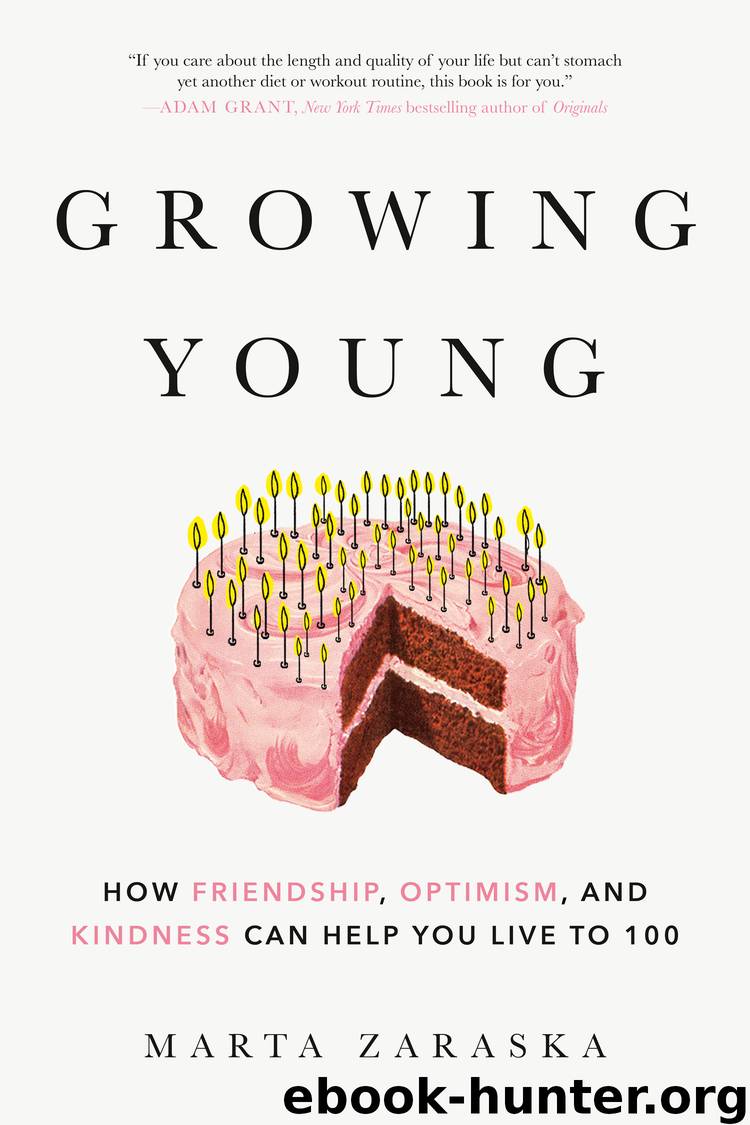Growing Young by Marta Zaraska

Author:Marta Zaraska
Language: eng
Format: epub
Publisher: Appetite by Random House
Published: 2020-06-15T16:00:00+00:00
Empathy 101
On a hot, stuffy day in London, UK, in a bright, white-walled classroom of the Ashburnham Primary School, two dozen nine- and ten-year-olds sat in a circle around a green blanket. There, in the middle of that woven stage, lay a ten-month-old baby, clad in a onesie with “Roots of Empathy” written across the tummy. Her name was Evelyn, and today she was the star. Everyone’s eyes followed her as she strained to reach a pink plush clam that had rolled away. Libby, Evelyn’s mom, helped her get the toy and started playing with it, making it squeak repeatedly. At first, Evelyn was curious, but she soon got upset. She whimpered in frustration. “Too much, baby?” Libby asked.
Christine Zanabi, an empathy instructor, turned to the big children: “Did you notice what the mom said?” A girl with long, strawberry-blond hair replied: “She said, ‘too much.’ ” The instructor nodded: “So mom is really tuned in to how the baby is feeling, ‘It’s a bit too much, it’s too exciting.’ We saw the mom help the baby regulate her feelings.” The instructor paused, then continued. “When you are feeling upset, how do you regulate yourself? What to do you do to feel a little bit calmer?” Hands shot up, and a girl was chosen to reply, “To calm myself, I draw.” Then another: “I sing.” Christine suggested that singing may soothe the baby too, so the students picked up a tune: “Hush little baby, don’t say a word…” Evelyn watched them intently and stopped crying. “What’s happened when you were singing?” Christine asked. An answer came: “She went much more quiet.” The instructor then pointed out to the children that they sang the song more softly than they usually do, subconsciously tuning in to the baby’s needs. She asked them to recall the times in their lives when they experienced frustration, the way Evelyn did when playing with the toy. Once again, many hands rose.
What I witnessed that day in London was part of a program called “Roots of Empathy” run by a Canadian non-profit with the same name. The idea is to teach children emotional literacy so that they become more sensitive and socially integrated human beings. The babies in the program are the “teachers”—by observing their development over the course of several months, by labelling their feelings and comparing them to what they experience in their own lives, the students, ages five to thirteen, learn to be more empathic. As a result, classroom bullying goes down while pro-social behaviours go up. According to the research done on the program, the results last for at least a year after the intervention.
Many other studies confirm that training empathy does indeed work. It works for children, resident physicians, and sex offenders. The curricula differ, but they usually offer a mixture of such approaches as learning to decode facial expressions, improving listening skills, and mastering how to take the perspective of another person. Some actors can be a good example of how investing a lot of effort into empathy can pay off.
Download
This site does not store any files on its server. We only index and link to content provided by other sites. Please contact the content providers to delete copyright contents if any and email us, we'll remove relevant links or contents immediately.
| Beauty, Grooming & Style | Diets & Nutrition |
| Exercise | Longevity |
| Medical Conditions & Diseases |
The Longevity Diet by Valter Longo(4445)
The Body: A Guide for Occupants by Bill Bryson(3800)
Ikigai by Héctor García & Francesc Miralles(3141)
Limitless by Jim Kwik(2619)
The Body by Bill Bryson(2219)
The Checklist Manifesto by Atul Gawande(2202)
Memory Rescue by Daniel G. Amen(1961)
What Color Is Your Parachute? 2015 by Richard N. Bolles(1927)
Becoming Myself by Irvin D. Yalom(1908)
Breath by James Nestor;(1760)
Fat for Fuel by Joseph Mercola(1694)
Memory Rescue: Supercharge Your Brain, Reverse Memory Loss, and Remember What Matters Most by Amen Dr. Daniel G(1570)
Weight Training by Thomas Baechle(1461)
Awakening Your Ikigai by Ken Mogi(1461)
50 After 50 by Maria Leonard Olsen(1375)
Starting Over (Sugar Creek Romance ) by Jordan Silver(1374)
1610396766 (N) by Jo Ann Jenkins(1296)
The Telomerase Revolution by Michael Fossel(1287)
Supernormal: The Untold Story of Adversity and Resilience by Jay Meg(1250)
